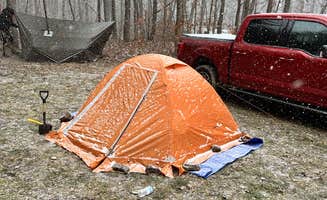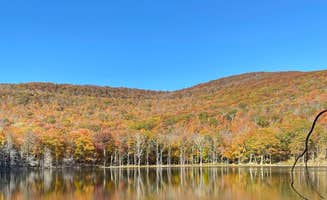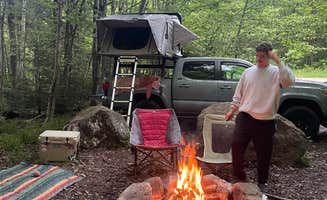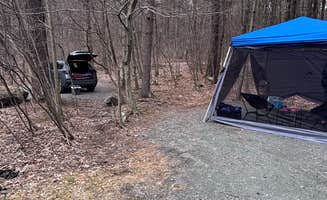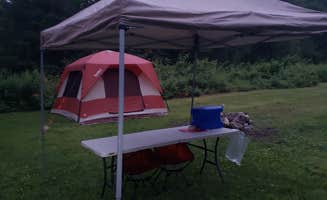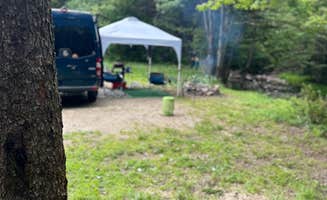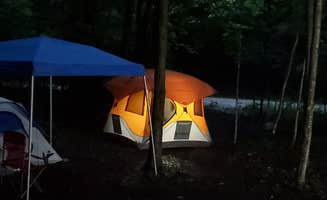Dispersed camping near Glenmont, New York offers varied terrain from wooded valleys to hillside locations at elevations between 800-2,400 feet. The region experiences seasonal fluctuations with summer highs averaging 70-85°F while winter camping demands preparation for below-freezing temperatures and potential snow. Most sites operate under standard Department of Environmental Conservation regulations for New York State Forest lands with 14-day maximum stays.
What to do
Fishing in nearby streams: Betty Brook Camp provides excellent stream fishing opportunities directly beside the campsite. As one camper notes, "You camp on the stream. There is a couple of spots" which makes it convenient for anglers to try their luck between camping activities.
Winter camping excursions: Burnt Rossman State Forest offers year-round camping possibilities for those prepared for colder conditions. A reviewer shared their experience: "Was a great location for winter camping. Site easily accessible from road. Beautiful, peaceful, great time!"
Hiking to elevated viewpoints: Echo Lake rewards hikers with panoramic vistas. One camper explained, "We camped on the hill with a beautiful view of the whole lake and breeze." The surrounding hills provide natural elevation gains for more challenging day hikes.
Brewery and distillery visits: Several primitive campsites serve as good base locations for exploring local beverage producers. A George D Aiken Wilderness Dispersed camper mentioned, "Brewery, distillery, beautiful lakes and scenic towns all within 15 minutes of the sites."
What campers like
Multiple campsite options: NFR 273 Dispersed Camping Spot offers numerous potential camping locations along the forest road. One visitor observed the area has "Large enough for 2-3 vehicles or one large rig/RV. Very few vehicles pass, some days none. Two fire rings set up: a large one and a small cooking one."
Privacy between sites: Duck Pond Campsite provides surprising seclusion despite road access. A camper noted, "After driving unpaved dirt road for a while, we arrived at surprisingly well maintained beautiful campsites. The pond is small so the mosquitos were not too bad. So few people passed by and very unknown quite and we just loved the experience."
Water access: Echo Lake's tent platforms offer water proximity and cooling breezes. As one visitor described, "There are tent sites around the whole lake with fire pits and 1 lean-to site at the end of the trail when you first arrive at the lake. The sites are relatively flat and well shaded with trees."
Natural fire rings: Many sites feature established stone fire rings. At Ushers Road State Forest, a visitor reported finding "a previously used campsite, approximately 200 feet from the main trail. The site includes a stone fire ring, indicating prior use."
What you should know
Road conditions vary dramatically: Access roads to primitive sites can challenge vehicles. At George D Aiken Wilderness Dispersed, campers note: "Road was quite good" while others report seasonal challenges: "It had rained a lot prior to our arrival, and several sites were damp."
Seasonal bug activity: Insect intensity varies by location and season. One NFR 273 camper reported: "A LOT of bugs due to dense wooded surroundings. The bugs seems to be unbothered by the bug spray as well."
Weekend crowds: Some normally quiet sites become busier at peak times. A visitor to NFR 273 shared: "Went on a Wednesday night late October and had to drive about 4 miles down the dirt road to find a suitable spot. After what was very quiet and a peaceful place to be."
Cell service limitations: Digital connectivity is unreliable throughout the region. Signal strength varies based on carrier and precise location, with some campers reporting only "Intermittent cell service" in many areas.
Tips for camping with families
Choose established sites: Betty Brook Camp offers amenities that make family camping more comfortable. A local recommends it noting, "It is rather remote, but it is right along West kill road. There's a stream alongside it, a fire pit, and a town about 8 mi away."
Plan for weather changes: The region experiences rapid temperature shifts, particularly in spring and fall. Pack additional layers and rain protection even during seemingly stable weather periods.
Bring ample water: While some sites advertise water access, treatment is necessary. Natural water sources should be properly filtered or boiled before consumption.
Identify backup locations: Popular sites fill quickly during summer weekends and holidays. Scout multiple options beforehand or arrive mid-week when possible for the best selection.
Tips from RVers
Size limitations: Most dispersed sites accommodate smaller rigs only. A Betty Brook Camp visitor cautioned: "I would not recommend this for large trailers. The site is fairly small, but it's in state park, and there's tons of walking that can be done."
Road clearance considerations: Many access roads require higher clearance vehicles. At Duck Pond Campsite, a visitor warned: "Just be careful driving in the sometimes rough conditions."
Leveling challenges: Natural terrain at most sites requires leveling blocks. Prepare for uneven parking surfaces throughout the Glenmont region.
Advance scouting recommended: Given inconsistent road conditions, scouting potential campsites before bringing a larger rig is advisable. Most established sites have limited turn-around space.


